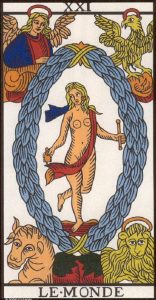Plato’s ideal state is not, in fact, for everyone.
Be Careful What You Wish For
What would be your ideal vacation? Piña coladas on a tropical island? A cruise around the world? A tour of European museums? Road trip across America? But then you get there and you have a headache, or you lose your luggage, the waiter is rude, or you have a flat tire. Something happens and you become identified, negative, or occupied with the emotional parts of centers. Is that your idea of the ideal vacation? Wish you could turn back time and do something different? Is there something to wish for that will make you better equipped to deal with these situations?
Everything is Internal
What is behind all of these problems of identification, negativity, indulgence in the instinctive and emotional parts of centers? It is a little like the story of the genie. You ask for one thing and another problem comes to haunt you. This is life. There is always something to deal with. The closest you might get to a wish that covers everything would probably have to include your state of consciousness. In a higher state, there is a level of separation from the four lower centers. There is a certain contentment with being who you are, with things as they are. You could be washing dishes or enjoying your piña colada–and friction will just not have the same effect on you. As a matter of fact, friction becomes the fuel for the higher state and helps to prolong it.
Sounds ideal, does it not?
Plato’s Ideal State
People have typically understood Plato’s ideal state as a utopian description of a specific place, a kingdom or a city. According to Plato, who conceived this idea 2500 years ago, the leader of the ideal state is not a king, politician, or a general, seeking power and influence. The leader is a philosopher who leads based on objective wisdom. The ultimate common goal of the people of this ideal state is the happiness of the whole, rather than the happiness of individuals or classes. This ideal has rarely been approximated externally. But internally it very much aligns with our experience of higher states of consciousness.

The Inner Circle in Plato’s Ideal State
Two esoteric systems that describe states of consciousness along similar lines are the Fourth Way and the Tarot. In the Fourth Way, the philosopher king is the steward, guiding efforts to self-remember together with work I’s. These would be I’s that support the efforts to awaken higher centers. The steward also helps fend off any denying force coming from the many I’s.
In fact, Plato’s ideal state was never meant to include everyone, only those who support it. In Athens there were many who wanted Socrates put to death. Internally, the many I’s will never really support self-remembering. Only a small inner circle of work I’s will promote the presence of higher centers.
But the steward can subdue the instinctive center and other centers if they cannot be supportive. This is expressed in card 21 of the Tarot, called The World. The steward (angel) keeps the different lower centers under control. The lower centers are shown in the corners, while the higher emotional center in the middle is awake.
Ernst Newman has written several articles for FourthWayToday.org, including: https://fourthwaytoday.org/right-location/ and https://fourthwaytoday.org/forging-ones-being.
